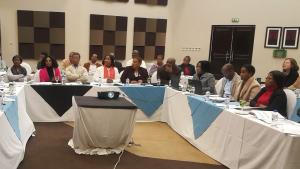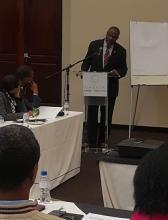Botswana Continues To Explore Ways To Reduce Maternal Mortality
Gaborone, Botswana – 27 July 2018: The Ministry of Health and Wellness (MoHw) convened a national summit from 12th – 13th July 2018 to review progress in on-going efforts to reduce maternal mortality currently estimated at 157 deaths per 100,000 live births in 2016. This summit is a follow-up of outlined interventions to track progress in addressing the unacceptable high maternal mortality in the country. The MoHw had earlier organized two previous national summits for stakeholders on the same subject matter.
This summit convened senior managers and service providers from eight (8) hospitals with high maternal deaths to assess progress and share experiences in maternal mortality reduction efforts. The meeting also highlighted operational challenges, constraints, as well as innovative interventions to generate further reduction in maternal deaths.
Dr Sinvula, the Deputy Permanent Secretary Public Health Management in his speech, emphasised the importance of working together to address underlying issues driving the high rate of maternal mortality. He expressed the need to implement pragmatic measures including identification and scale up of proven preventive interventions, including systematic death audits and adherence and strict compliance to national protocols and guidelines. He reminded participants of the theme of the summit which stated thus: “no woman should die giving birth, not in my hands”; and illustrated need for prevention by stating that for example, in 2016, 80 deaths were recorded of which 75% were preventable which would have resulted in only 20 deaths.
He informed the summit of the reform action taken by the MoHw to improve the health sector performance, including restructuring of the MoHW with approval of designated staffing positions across the eighteen newly created Health districts. Furthermore, plans are at advance stage to use one districts as a pilot for the Primary Health Care system to address maternal and neonatal mortality reduction. In addition, active collaboration between the public and private practitioners will be facilitated to encourage avenues for local gynaecologists to l be attached to identified government hospitals to strengthen maternal mortality and newborn reduction initiatives.
In his remarks, Dr Ovberedjo – WHO Representative stated that Botswana is unique in that women die within health facilities unlike other countries where women die in the communities. That whereas access to health facilities is good given good roads, existing infrastructure. However quality of care including availability of skilled care is a major concern He reminded participants on the several opportunities to adopt proven evidence based intervention and prevention measures to generate desired improvement. -given the current efforts and momentum by government and partners are making to reduce these unnecessary deaths.
Several presentations were made by stakeholders including the National Audit Committee and participating hospitals which identified the leading contributing factors to maternal mortality reported included haemorrhage, abortion and eclampsia. In addition, major concern was raised at the unusual number of deaths occurring as a result of bleeding post Caesarean Section (C/S) Participants noted that this situation could be a result of skill deficiency among attending service providers which requires urgent attention.
However, athe summit acknowledged comnedable progress achieved including reduction of maternal death in several hopsitals in 2017 as a result of community education, adherence to EmONC guidelines, better monitoring of patients in labour and timely involvement of specialists. Several promising best practices initiated were highlighted including establishment of one month staff rotation to improve EmoNC skills as part of improvement of patient flow and quality of care are decongesting normal deliveries to clinics with maternity services.
The summit outlined a number of recommendations to address fundamental challenges including quality of care, poor adherence to existing norms and care protocols and management of obstetric emergencies. The Permanent Secretary MoHw, Ms Maporisa in her closing remarks, affirmed commitment by the MoHw to take urgent actions address identified managerial and operational issues raised during the summit including:
• Actions to improve skills acquisition for all Medical Officers and interns to have requisite surgical skills;
• Deployment of midwives to maternity wards to enhance skilled care; and
• Actions to improve mentoring and support supervision and system wide learning and accountability.





